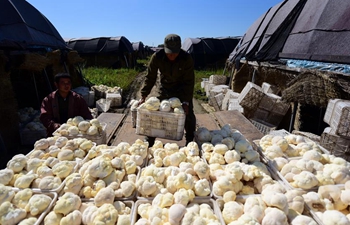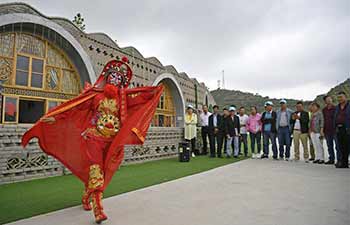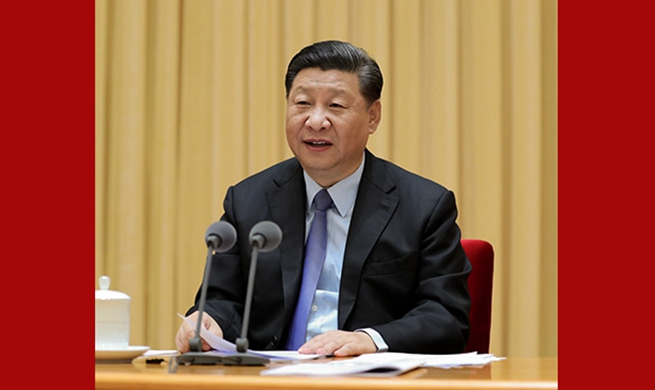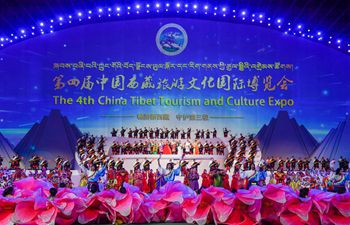UNITED NATIONS, Sept. 10 (Xinhua) -- UN Secretary-General Antonio Guterres on Monday called for more efforts from member states to fight corruption.
People across the world continue to express outrage at the corruption of their leaders, and at how deeply corruption is embedded in societies. They are rightly calling for political establishments to operate with transparency and accountability, or make way for those who will, he told the Security Council.
"I call on leaders everywhere to listen, to nurture a culture of integrity and to empower citizens to do their part at the grassroots. We must all do more to fight corruption, strengthen governance and build trustworthy institutions that can ensure probity and progress for all."
Member states must be on the front lines in the fight against corruption. It is especially important to build up the capacity of national anti-corruption commissions and prosecutorial efforts, he said.
Governments can also enhance anti-corruption efforts by ensuring independent judiciaries, a vibrant civil society, freedom of the press and effective whistleblower protection. The international community can complement those efforts by working more effectively against money laundering, tax evasion and the illicit financial flows that have deprived countries of much-needed resources, and that feed further corruption, said the UN chief.
Corruption can be a trigger for conflict, he said. "As conflict rages, corruption prospers. And even if conflict ebbs, corruption can impede recovery."
Corruption drives and thrives on the breakdown of political and social institutions. These institutions are never more in crisis than in times of conflict, he said.
Corruption is linked to many forms of instability and violence, such as the illicit trafficking in arms, drugs and people. The connections between corruption and terrorism and violent extremism have been repeatedly recognized by the Security Council and the General Assembly. Assets stolen through corruption can be used to finance further crimes, including violent extremist and terrorist acts, said Guterres.
Large-scale corruption surveys conducted by the United Nations Office on Drugs and Crime found that bribery of public officials was particularly high in areas affected by conflict. In conflict situations, stakeholders such as anti-corruption commissions, civil society and the media may be weakened or hindered in their essential work, he said.
The consequences of corruption in times of conflict can be especially devastating as they can affect the most basic needs and exacerbate hunger and poverty, he said.
Combatting corruption and addressing governance challenges, which lie at the root of many conflicts, must be a component of preventive approaches, said Guterres. "This is an opportunity to build a solid foundation of trust and accountability and increase a society's resilience to crisis."
In peace operations, UN engagement should be designed and implemented with a clearer anti-corruption lens to reinforce a culture of accountability and respect for the rule of law, he added.
He called for the implementation of the UN Convention Against Corruption.
Before the adoption of the convention 15 years ago, there was no global instrument to criminalize corruption, or to recover stolen proceeds. Now the convention has 186 states parties, and the crime of corruption is on the books of nearly every country in the world, he said. "The convention's robust peer review mechanisms have served as a global framework for international cooperation to strengthen prevention, to disrupt money laundering schemes, return stolen proceeds from foreign banks and other necessary actions. I encourage all member states to bring greater resolve to its implementation."
Guterres also asked member states to take profit of advances of technology, which offer an opportunity to massively expand public participation in governance and to increase accountability.
Corruption is present in all countries, rich and poor, North and South, developed and developing, said Guterres.
The World Economic Forum estimates that the cost of corruption is at least 2.6 trillion U.S. dollars, or 5 percent of global gross domestic product. And according to the World Bank, businesses and individuals pay more than 1 trillion dollars in bribes each year, he said.
Corruption robs schools, hospitals and others of vitally needed funds. It rots institutions as public officials enrich themselves or turn a blind eye to criminality. It deprives people of their rights, drives away foreign investment and despoils the environment. Corruption breeds disillusion with government and governance, and is often at the root of political dysfunction and social disunity.
The poor and vulnerable suffer disproportionately. And impunity compounds the problem, he said.

















